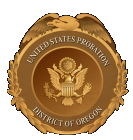What Supervision Is
In the federal courts, supervision is
- a core responsibility of U.S. probation and pretrial services officers, along with investigation.
- a way to monitor the activities and behavior of people released to the community by the federal courts or paroling authorities.
- an opportunity to help offenders reintegrate into the community following a period of incarceration.
- in the case of probation, a punishment that is less severe than imprisonment, but still holds people accountable for breaking the law.
- an alternative to jail or prison that costs less than incarceration and gives people charged with or convicted of federal crimes the opportunity to live with their families, hold jobs, and be productive members of society.
What It Accomplishes
Supervision addresses several key criminal justice goals. Through supervision, officers:
- Enforce the court's order. Officers make sure people on supervision comply with the conditions the court has set for their release to the community.
- Protect the community. Officers reduce the risk that people on supervision commit crimes. They also reduce the risk that people who are awaiting trial flee rather than return to court as required.
- Provide treatment and assistance. Officers help people on supervision correct problems that may be linked to their criminal behavior by directing them to services to help them. These services may include substance abuse or mental health treatment, medical care, training, or employment assistance.
How Officers Supervise
In working with people on supervision, officers
- inform them of what the court expects of them.
- meet with them at home and at work.
- monitor their compliance with the conditions the court has set for their release.
- step in to control and correct if they don't comply.
